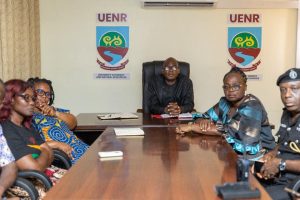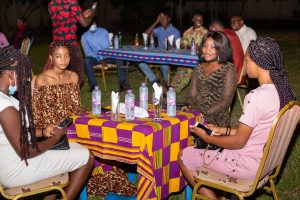The Former National President of University Teachers Association of Ghana (UTAG) and Vice-Rector of Ghana Institute of Journalism (GIJ), Prof. Eric Opoku Mensah has urged members of the Association to make an impact with science communication using social media tools to disseminate their research findings for public consumption especially in this era of technology and Covid-19. He noted that the impact of their research can be seen when the public gets to know and understand how the findings affect them.
According to him, the role of UTAG in public universities and the role of government are intertwined and key to nation building, however with funding most of the research findings can be put to good use in society. He added that with funding as a key component, researchers can explore to the fullest in addressing the country’s challenges. He also revealed that with government and other support to undertake research on the Covid-19 Virus, the world witnessed the eminent duty of the Noguchi Memorial Institute for Medical Research in leading research in the country and beyond in the wake covid-19 pandemic.
Prof. Opoku Mensah made this disclosure when he delivered a speech on the Role of UTAG in Higher Education in Ghana at a Forum convened by UTAG-UENR Chapter in partnership with the UENR 10th Anniversary Celebration Planning Committee on Wednesday, October 12, 2022 at the Sunyani campus of the university. The event was on the theme: “Ten Years On: UENR and Higher Education in Ghana” with emphasis on key topics including the role of UTAG in higher education in Ghana, UENR in perspective: Impact, prospects and challenges and the survival of young universities in a globalized higher education terrain.
As part of his delivery, Prof. Opoku Mensah added that Universities in their capacity can help lecturers to fulfill their mandate when the University provides an atmosphere of ability to conduct research and teaching void of tribalism, hooliganism, individualism among other negative sentiments.
Speaking on the topic, ‘‘UENR in perspective: Impact, Prospects and Challenges’’, the former Dean of the School of Arts and Social Sciences, Prof. Yaw Ofosu-Kusi explained that UENR in the ten years of its existence has contributed significantly in diverse ways to the country’s development. He noted that the institution has offered expertise and provided solutions to various national issues including renewable energy, sustainable agriculture, climate change, illegal small-scale mining, and Science, Technology, Engineering, Arts and Mathematics (STEAM) education.
Prof. Ofosu-Kusi maintained that graduates from UENR have become agents of change in the energy and natural resources sectors, emphasizing that the 10 centres in the university will continue to develop the next generation of research experts for Ghana. He however bemoaned the lack of infrastructure and financial support for the university and called on the government to concentrate and allocate more funds in developing the institution. Prof. Ofosu-Kusi said “UENR was a small tertiary institution with a very small students’ population, regrettably those narrow buildings that suited them a decade ago still form the structure bases of UENR with few additional infrastructure’’.
In his presentation on the topic: “The Survival of Young Universities in a Globalized Higher Education Terrain’’, the former Pro Vice-Chancellor of the University of Cape Coast (UCC), Prof. George T.K. Oduro encouraged UENR and other younger universities in the country to embrace and inculcate the culture of entrepreneurship to enable them soar up their internally generated funds to undertake infrastructural development. Prof. Oduro further stressed that young universities like UENR should prioritize investing more into ICT infrastructure to ensure equity and promote quality teaching and learning.
Prof. George T.K. Oduro giving a presentation
Commenting on the Forum, the Vice-Chancellor of the University of Energy and Natural Resources, Prof. Elvis Asare-Bediako, who chaired the programme, applauded UTAG-UENR for organizing its members to deliberate on such matters of national interest. He stated that the association has played a significant role in the growth of the university and higher education in Ghana. The forum was attended by the Acting Pro Vice-Chancellor, Prof. John Kuwornu, the Registrar, Mr. Solomon Panford, UTAG-UENR President, Mr. Reginald Djimatey, Deans and HoDs of various schools and departments and UTAG members.







